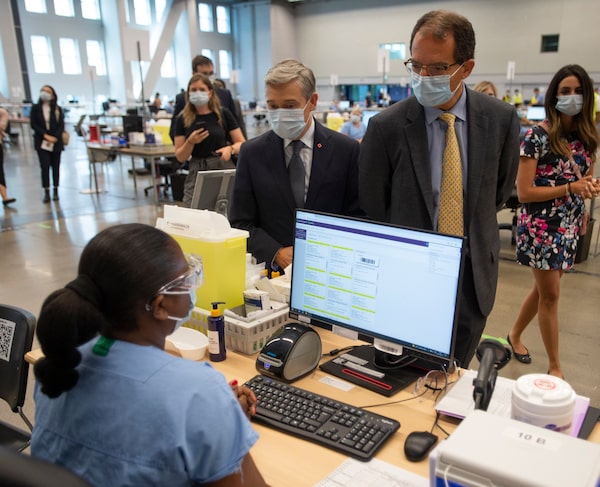
Federal Innovation Minister Francois-Philippe Champagne, left, and Stephane Bancel, chief executive of Moderna Therapeutics, visit a COVID-19 vaccination clinicon Aug. 10, 2021 in Montreal.Ryan Remiorz/The Canadian Press
Moderna Inc. announced an agreement with the federal government to build an mRNA vaccine manufacturing facility in Canada, boosting the country’s efforts to reduce its dependence on others for vaccine supply.
Moderna’s chief executive officer Stéphane Bancel said the Massachussets-based company still needs to find a location within Canada, but he anticipated the new facility, which would initially employ 200 to 300 people, would be ready to ship products by 2024. Financial details of the deal were not disclosed.
“Whether it’s a small outbreak or a big pandemic like the one we just saw, God forbid, Canada will be ready,” Mr. Bancel told reporters on Tuesday. “We’ll be ready on Canadian soil to make in a matter of months a new vaccine for a new emerging virus to protect the Canadian population.”
At a news conference with Mr. Bancel in Montreal, Innovation Minister François-Phillippe Champagne declined to provide financial details. But he said as part of the memorandum of understanding the government signed with Moderna, it has agreed to buy an undisclosed number of vaccines from the facility, and he added the company is looking at producing 24 vaccines for different types of diseases.
During the slow initial rollout of COVID-19 vaccines, the federal government came under fire for failing to build domestic biomanufacturing capacity, relying instead on other countries to supply vaccines. In recent months, Ottawa has made multiple investments to boost domestic vaccine manufacturing. It earmarked more than $2.2-billion over seven years in the 2021 budget to grow the life sciences and biomanufacturing sector.
In February, Ottawa announced an agreement with U.S. vaccine maker Novavax Inc. to produce its COVID-19 vaccine candidate at the National Research Council’s new Montreal facility, completed in June. The timeline for production will depend on when Novavax receives the required approvals from Health Canada, the National Research Council said.
The government also announced it would give $25-million to Vancouver’s Precision NanoSystems Inc. That company is building a biomanufacturing centre expected to be operational in March, 2023.
In March, Paris-based pharmaceuticals company Sanofi SA said it will build a new influenza vaccine manufacturing facility in Toronto, supported by $415-million from the federal government.
And in May, the federal government announced it was investing $199-million in Resilience Biotechnologies Inc. to support a $401.5-million expansion of a Mississauga facility, which would allow the company to manufacture up to 640 million doses of mRNA vaccines a year.
As of late last month, Canada had enough COVID-19 vaccine doses to fully vaccinate every eligible person in the country, with a total of 66 million doses.
A new Moderna manufacturing plant would allow for domestic production of COVID-19 booster shots, and other vaccines, Mr. Bancel said.
The company has developed a high-efficacy influenza vaccine, a vaccine for respiratory syncytial virus, which is a leading cause of pediatric hospitalizations each winter, and it is working on one for the Zika virus, Mr. Bancel said. It is also developing mRNa therapies to treat cancer, autoimmune disease, heart conditions and rare genetic disorders.
As part of the agreement with the company, the Canadian government can also instruct Moderna to switch its production line to meet Ottawa’s needs, he said.
Initially, the new Canadian plant will likely manufacture a COVID-19 booster shot, adapted to newer variants of the coronavirus, Mr. Bancel told The Globe and Mail. He said the company wants to create a product that combines a COVID-19 booster with its influenza vaccine that can be administered each fall.
The company’s agreement with the government also includes the creation of a research and development hub. Development activities will likely employ people to work from home, Mr. Bancel said, while the research will involve partnering with Canadian academic institutions to work with the company’s team in Cambridge, Mass.
D. Lorne Tyrell, founding director of the Li Ka Shing Institute of Virology and a distinguished professor in the Department of Medical Microbiology and Immunology at the University of Alberta, welcomed the news on Tuesday, saying it will help retain the scientific talent pool in Canada.
He cautioned, however, that the country needs to support the basic sciences to ensure its biomanufacturing facilities are at the cutting edge.
“It’s important that we don’t build them and then they become not active enough,” he said.
Some homegrown vaccine makers say they’ve been left off the government’s radar.
In March, 2020, Calgary-based Providence Therapeutics Holdings Inc. was a month behind Moderna with its COVID-19 vaccine candidate, Providence chief executive Brad Sorenson said in an e-mail. But Moderna, with funding from the U.S. government, has seen sales of its vaccine soar to the billions, and it has become “a prototypical large pharma that obtains taxpayer support in Canada.” Providence, however, never received material support in Canada, he said.
“Providence Therapeutics will continue to develop it’s world class mRNA platform and focus on opportunities outside of Canada where patient needs are greatest,” Mr. Sorenson said.
At the news conference Tuesday, Mr. Bancel said he expects Moderna will be able to submit technical data on its COVID-19 vaccine for children, ages 6 to 11, for Canadian regulatory approval by early fall. He anticipated the company will submit data on its vaccine for children, ages six months to five years, by end of the year.
Currently, the Pfizer-BioNTech COVID-19 vaccine is the only one approved in Canada for children ages 12 and older.
Our Morning Update and Evening Update newsletters are written by Globe editors, giving you a concise summary of the day’s most important headlines. Sign up today.